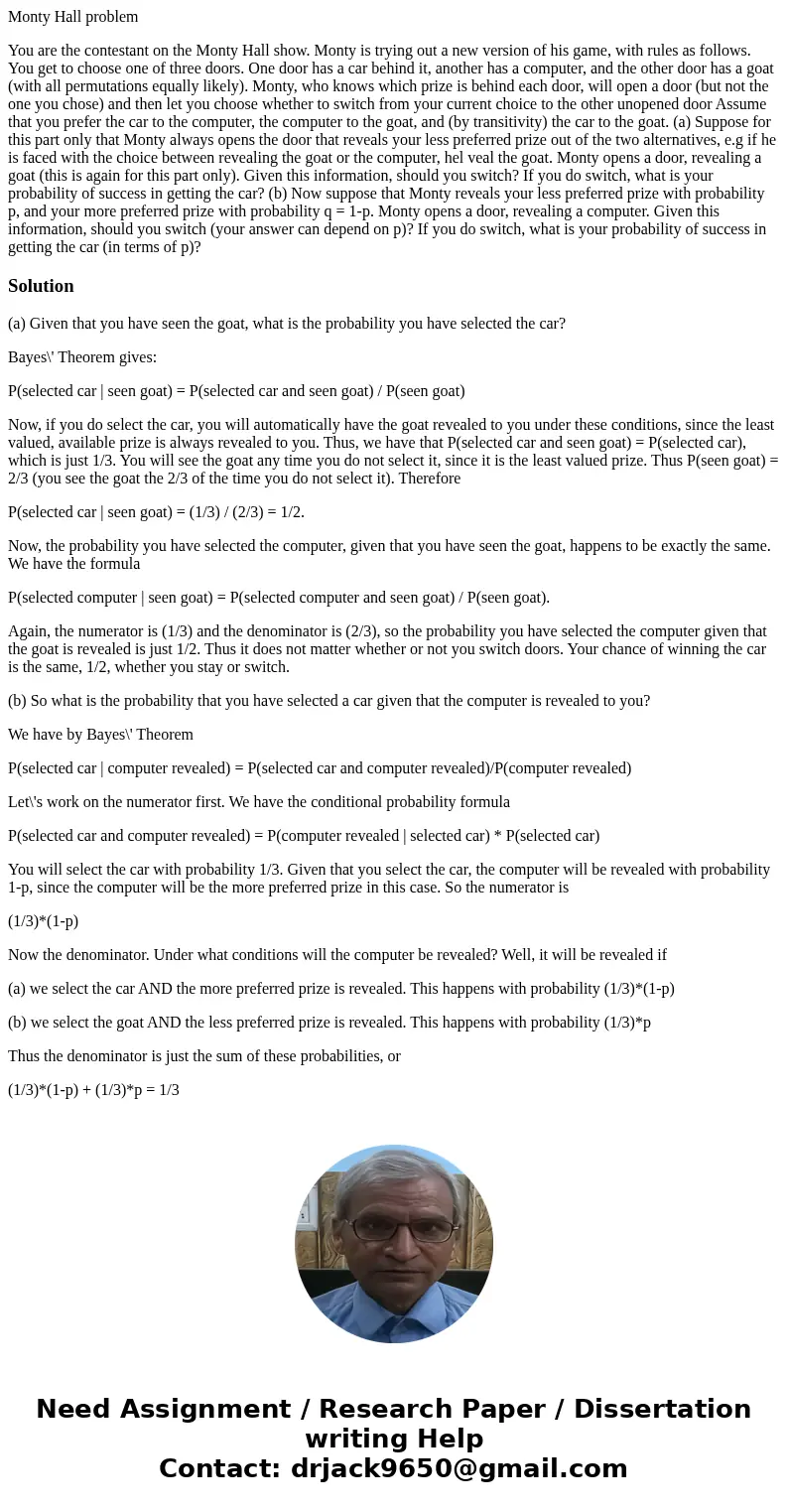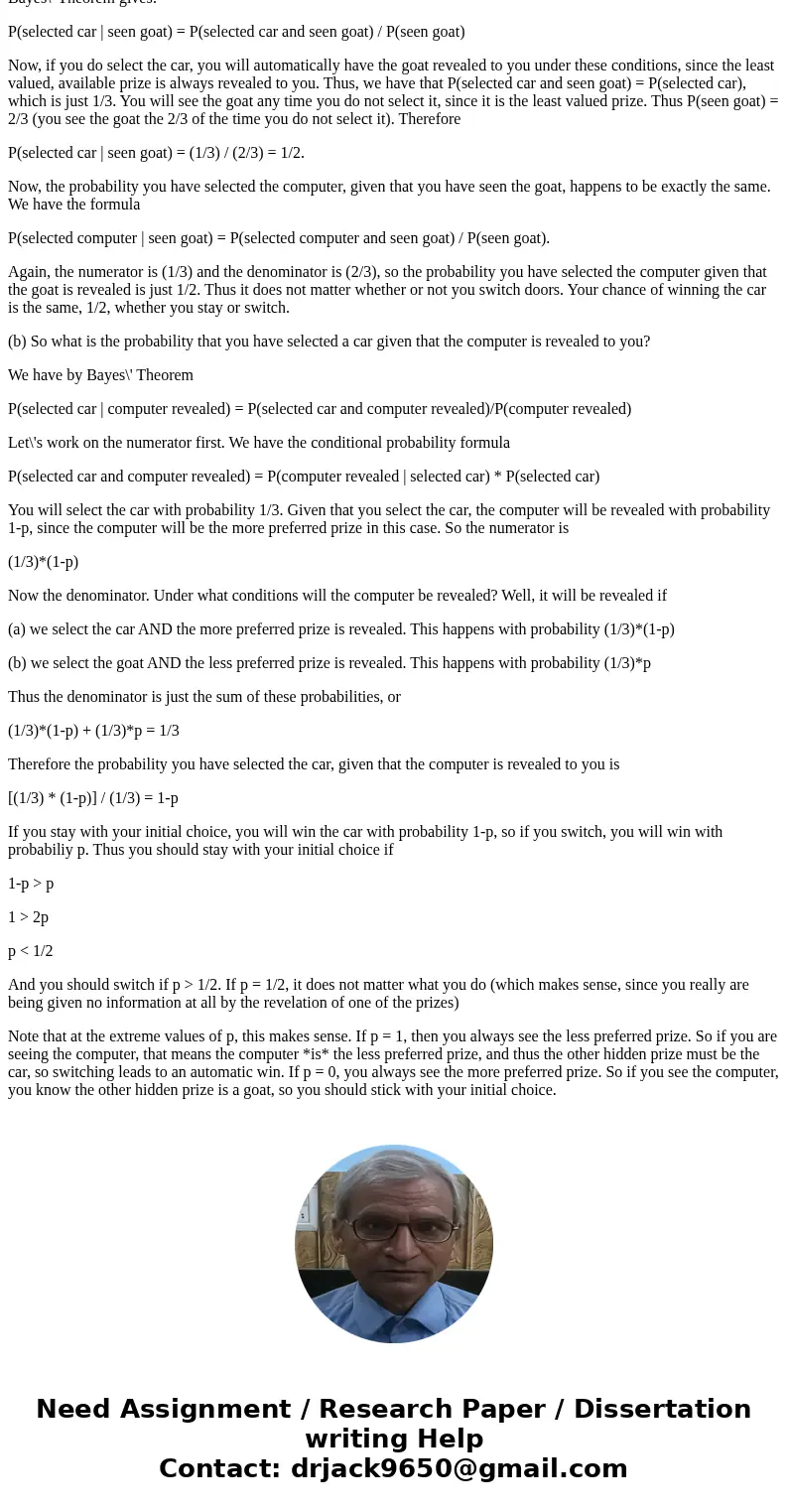Monty Hall problem You are the contestant on the Monty Hall
Monty Hall problem
You are the contestant on the Monty Hall show. Monty is trying out a new version of his game, with rules as follows. You get to choose one of three doors. One door has a car behind it, another has a computer, and the other door has a goat (with all permutations equally likely). Monty, who knows which prize is behind each door, will open a door (but not the one you chose) and then let you choose whether to switch from your current choice to the other unopened door Assume that you prefer the car to the computer, the computer to the goat, and (by transitivity) the car to the goat. (a) Suppose for this part only that Monty always opens the door that reveals your less preferred prize out of the two alternatives, e.g if he is faced with the choice between revealing the goat or the computer, hel veal the goat. Monty opens a door, revealing a goat (this is again for this part only). Given this information, should you switch? If you do switch, what is your probability of success in getting the car? (b) Now suppose that Monty reveals your less preferred prize with probability p, and your more preferred prize with probability q = 1-p. Monty opens a door, revealing a computer. Given this information, should you switch (your answer can depend on p)? If you do switch, what is your probability of success in getting the car (in terms of p)?Solution
(a) Given that you have seen the goat, what is the probability you have selected the car?
Bayes\' Theorem gives:
P(selected car | seen goat) = P(selected car and seen goat) / P(seen goat)
Now, if you do select the car, you will automatically have the goat revealed to you under these conditions, since the least valued, available prize is always revealed to you. Thus, we have that P(selected car and seen goat) = P(selected car), which is just 1/3. You will see the goat any time you do not select it, since it is the least valued prize. Thus P(seen goat) = 2/3 (you see the goat the 2/3 of the time you do not select it). Therefore
P(selected car | seen goat) = (1/3) / (2/3) = 1/2.
Now, the probability you have selected the computer, given that you have seen the goat, happens to be exactly the same. We have the formula
P(selected computer | seen goat) = P(selected computer and seen goat) / P(seen goat).
Again, the numerator is (1/3) and the denominator is (2/3), so the probability you have selected the computer given that the goat is revealed is just 1/2. Thus it does not matter whether or not you switch doors. Your chance of winning the car is the same, 1/2, whether you stay or switch.
(b) So what is the probability that you have selected a car given that the computer is revealed to you?
We have by Bayes\' Theorem
P(selected car | computer revealed) = P(selected car and computer revealed)/P(computer revealed)
Let\'s work on the numerator first. We have the conditional probability formula
P(selected car and computer revealed) = P(computer revealed | selected car) * P(selected car)
You will select the car with probability 1/3. Given that you select the car, the computer will be revealed with probability 1-p, since the computer will be the more preferred prize in this case. So the numerator is
(1/3)*(1-p)
Now the denominator. Under what conditions will the computer be revealed? Well, it will be revealed if
(a) we select the car AND the more preferred prize is revealed. This happens with probability (1/3)*(1-p)
(b) we select the goat AND the less preferred prize is revealed. This happens with probability (1/3)*p
Thus the denominator is just the sum of these probabilities, or
(1/3)*(1-p) + (1/3)*p = 1/3
Therefore the probability you have selected the car, given that the computer is revealed to you is
[(1/3) * (1-p)] / (1/3) = 1-p
If you stay with your initial choice, you will win the car with probability 1-p, so if you switch, you will win with probabiliy p. Thus you should stay with your initial choice if
1-p > p
1 > 2p
p < 1/2
And you should switch if p > 1/2. If p = 1/2, it does not matter what you do (which makes sense, since you really are being given no information at all by the revelation of one of the prizes)
Note that at the extreme values of p, this makes sense. If p = 1, then you always see the less preferred prize. So if you are seeing the computer, that means the computer *is* the less preferred prize, and thus the other hidden prize must be the car, so switching leads to an automatic win. If p = 0, you always see the more preferred prize. So if you see the computer, you know the other hidden prize is a goat, so you should stick with your initial choice.


 Homework Sourse
Homework Sourse